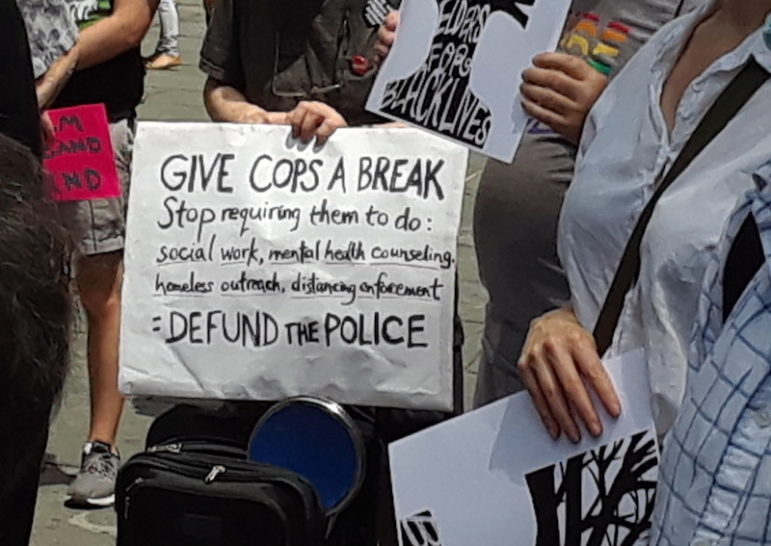
For 28 city budgets I was the director of public policy for LiveOn NY. I advocated on behalf of thousands of older New Yorkers and community-based organizations, known as the aging services network. New York City has the largest community-based network in the nation. With more than 50 percent of people over age 60 being people of color and immigrants, the aging network is on the frontlines, allowing elders to age with dignity and staving off isolation; after all, we all need a peer community throughout the lifespan. There are 1.7 million people over age 60 in New York with almost 20 percent living below poverty.
The aging network serves homebound elders meals-on-wheels and provides case management and home care services. They support family caregivers. There are always long waiting lists for homebound elders looking to have a case manager and receive home care. Imagine making 85-year-old people wait for services. The aging services workforce is mostly women of color and immigrants, and they have risen to the challenge of serving seniors during this time of COVID-19.
Each year we fought so hard to maintain funding, more often being cut. The fight goes on to this day by LiveOn NY and others. The mountains of ageism, racism and sexism were always too high a climb for the city to adequately fund services for the fastest growing segment of our population, those 60 and older.
Older people of color have lived a lifetime of racism. They have systemically been marginalized in housing, health care, education and employment. The organization I worked for wrote the first report in the nation on the impact of welfare reform on older adults way back under President Clinton, when he set a five-year time limit to receiving welfare. Guess who has shouldered that “reform”? Mothers and grandmothers, because that’s whom family members turn to when they need help.
Thousands of black grandparents in New York City, mostly grandmothers, are raising their grandchildren – with their adult child incarcerated, suffering from substance abuse or mental health challenges – amid conditions of poverty and a lack of city funding for services. Black women are caring for their parents and other family members. For Black caregivers, 35 percent of their income is spent on caregiving; for Latino caregivers, 44 percent; and for white caregivers, 14 percent. (Lack of universal health care and long-term care falls heavily on black families. That’s why it’s time to pass the New York Health Act.)
 CityViews are readers’ opinions, not those of City Limits. Add your voice today!
CityViews are readers’ opinions, not those of City Limits. Add your voice today!
Older adults are at the end of the “food chain” of a racist world. Older women of color are probably the poorest segment of the city’s population and among the most invisible. Older adults of color have “given the talk” to generations. They remember stop-and-frisk under Mayor Giuliani as well as under Mayor Bloomberg. They have felt the brunt of a bloated NYPD budget terrorizing them and their children, grandchildren and neighbors – their communities. Older adults are the true “safety net” of families and communities, and yet the city has never found its way to adequately support services that provided them with a safety net. Yet the NYPD budget always grew.
Now those adults are paying the price with their lives, dying in disproportionately high numbers from COVID, both in the community and in nursing homes because of “pre-existing” health conditions. It is time to shout out that the most dangerous “pre-existing” condition has been living in a racist society.
Once again, the mayor’s budget will cut Department for the Aging (DFTA) funds. It’s austerity time again. If across the board agency cuts of 7 to 10 percent are instituted, DFTA will be devastated. I lived through that during the Bloomberg administration. All while the NYPD was not be touched.
It was an open secret during those 28 city budgets I worked on that the NYPD budget would never get cut. It would grow. I’m hopeful now that New Yorkers are coming together in solidarity across generations to declare we must defund the NYPD and that no one is disposable.
We are demanding racial justice. We also need age justice. The June 24th rally at City Hall, #ELDERSFORBLACKLIVES, ended with a powerful and poignant intergenerational pledge – the younger and older activists pledged out loud to each other, “We will not let you down”.
We can speak in one voice to protect and expand human services and keep communities truly safe by building a caring economy that will allow all New Yorkers to survive and thrive.
Bobbie Sackman is a member leader of Jews for Racial and Economic Justice/NY Caring Majority and the former director of public policy at LiveOn NY.









One thought on “Opinion: Ageism and Racism are Twin Evils That NYers Must Defeat”
Love the way you connect all the dots . and the statistics you cite make the case for the historical and ever present interconnectedness between racism, ageism and power politics. It’s time to cut and stop the bloated NYPD budget to make room for a budget that attends to those who have shouldered so much of the true care in our community, and attend to real nourishment and support for our diverse and vital population.